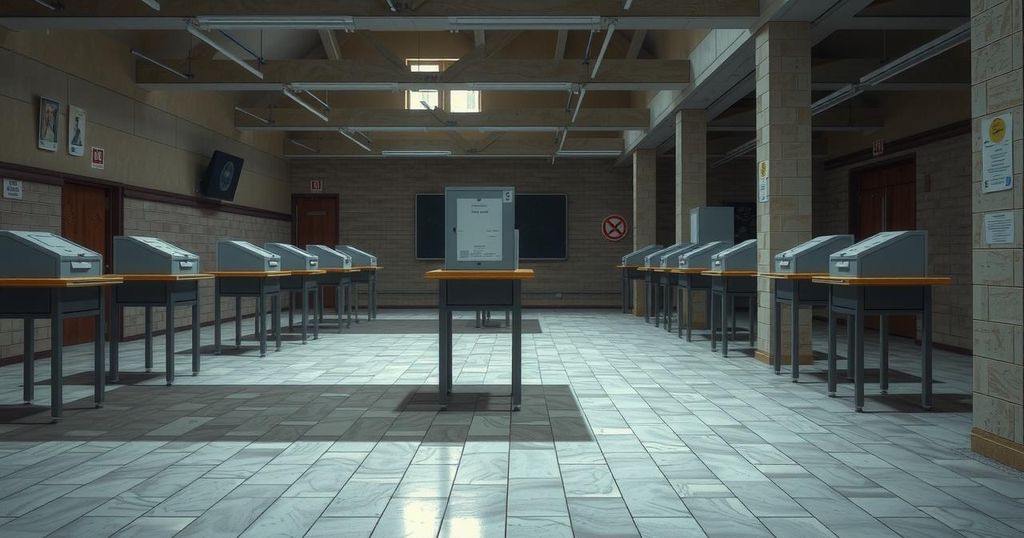Venezuela prepares for elections amid calls for a boycott from opposition leaders, stressing voter participation’s key role. The election, set for Sunday, happens against a backdrop of tensions, arrests, and international sanctions affecting the country’s economy and political landscape. The situation remains uncertain as citizens consider their participation in what many consider a sham process.
As Venezuelans gear up to head to the polls this Sunday, a significant debate surrounds voter participation. This election comes just ten months after President Nicolás Maduro’s contentious third-term claim, which was marred by claims of fraud and violence. It’ll be crucial to see how many voters turn out this time around, especially as leading opposition factions urge citizens to boycott what they label a fraudulent exercise.
The stakes are high as the nation prepares to elect not only a new parliament but also 24 state governors. Maria Corina Machado, a prominent opposition figure and former MP, is leading the charge against participating in the vote, advocating that taking part would only legitimize another sham election orchestrated by the Maduro regime.
On the contrary, some opposition members, including two-time presidential candidate Henrique Capriles, are advocating for participation. Capriles argues that abstaining from voting in the past has only allowed Maduro, who is now 62, to tighten his hold on power. “We must vote as an act of resistance, of struggle,” he said, reflecting a divide within the opposition camp.
Tensions are palpable ahead of this weekend’s elections. To prepare for potential unrest, authorities have deployed over 400,000 security personnel to ensure order during the voting process. Recently, Juan Pablo Guanipa, a prominent opposition ally of Machado, was arrested amid allegations of leading a supposed “terrorist network” devised to disrupt the vote. This accusation follows a sweep of arrests involving 50 individuals suspected of being mercenaries with foreign ties.
Venezuela’s government frequently claims that outside powers are attempting to instigate coups, using this narrative to justify actions against opposition leaders. For example, Edmundo Gonzalez Urrutia, another presidential candidate, was forced to seek asylum in Spain after threats against him escalated. Guanipa’s arrest is seen as part of a wider crackdown on dissent.
Public confidence in the electoral process has deteriorated, especially after the July presidential elections, during which Maduro asserted victory without providing verifiable results. The opposition’s own tally indicated a different outcome, pointing to Gonzalez Urrutia’s supposed win, while violent protests erupted following Maduro’s election claims. The situation has situated Venezuela as a pariah on the international stage, with only a few countries, like Russia and Cuba, acknowledging Maduro’s leadership.
Compounding these issues, Venezuela’s economy continues to deteriorate due to long-term mismanagement and external sanctions. Recent measures by the U.S. government have further ratcheted up pressure on the Venezuelan economy. For instance, President Donald Trump revoked Chevron’s permission to operate in the country, which could critically impact Maduro’s administration. Additionally, the U.S. has rescinded protective measures for around 350,000 Venezuelan migrants.
Amid this strained landscape, Venezuela is set to conduct elections that will also impact the disputed oil-rich Essequibo region. For decades, Guyana has governed this territory, yet Venezuela continues to assert claims of sovereignty, raising tensions between the two nations. This election is being observed closely, given its potential ramifications both domestically and internationally.
In summary, as Venezuela approaches its upcoming elections, a split among opposition leaders reveals significant tension regarding voter participation. With calls for a boycott against what many view as fraudulent elections, and the government tightening its grip, the outcome may be pivotal in shaping the future of this resource-rich nation. The added international pressures complicate the situation, potentially affecting both the current regime and the wider regional dynamics.
Original Source: www.france24.com






